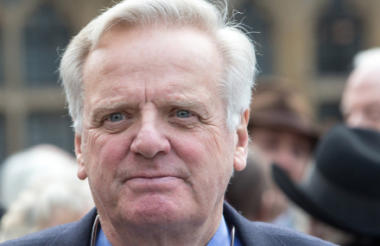Lord Grade, chair of the Fundraising Regulator, has incorrectly explained how the organisation’s Fundraising Preference Service will work on Radio 4 and BBC Breakfast this morning.
He appeared on Radio 4’s Today show this morning to explain how the Fundraising Preference Service would work ahead of its launch later this week. However, despite attempts to clarify how the service would work for the public, he instead inaccurately explained that the service would allow members of the public to opt-out of all communications from all charities.
On Radio 4's Today programme this morning he said: "You go online through our website or through a charity’s website and you can send a message that you do not want to hear either from any charities or that you only want to hear from those charities that you select that you favour. You can make phone calls to do it, it will be very simple to use, and we hope very effective."
Ahead of Lord Grade’s appearance on the today show, he was introduced by presenter John Humphreys who said: “How will it work? The man who knows is the chairman of the Fundraising Regulator Lord Grade.”
Speaking later in the interview, Grade said: “The FPS will cut through all that and it will be very simple. You can say ‘I only want to hear from Cancer Research, Guide Dogs for the Blind or whatever the charity is, I don’t want to hear from anybody else’ and it should be effected.”
Grade also appeared on BBC Breakfast where he made the same claims about the FPS, which he said was "launching in a week or so”. He said the public “can decide which charities they want to hear from, and which they don’t. And if they don’t want to hear from anybody, they can also do that as well. So it is a very simple system”.
But the Fundraising Regulator’s own website describes the FPS as a “new website based service”, and says: “By entering your details on the FPS website, you can choose to stop email, telephone calls, addressed post and/or text messages directed to you personally from a selected charity or charities.” There is also the option to call a helpline to do the same thing.
It adds that “three charities can be identified in any one online request. If you wish to identify further charities, you can do so by submitting new requests.” This is a very different explanation to how the process works than the one provided by the organisation’s own chair, where he said the a member of the public would be able to opt-out of all communications from all charities should they want to.
Members of the sector corrected Grade on Twitter, including Daniel Fluskey, head of policy and research at the Institute of Fundraising.
No it doesn't. People can select up to three charities they don't want to hear from. Important the public hear the right messages on this https://t.co/ArxwkF1Ij9
— Daniel Fluskey (@danielfluskey) July 4, 2017
The Fundraising Regulator were asked to respond to the comments made by Grade on the FPS. A spokesman clarified how the process will work, and said: "The FPS will allow a member of the public to enter a charity’s name or Charity Commission number it wishes to stop communication with. They must then choose the communication methods (post, text, phone, email) they wish to end and enter their contact details before submitting the request. The named charity will then receive notification of the suppression request and be invited to view it on the FPS portal, with 28 days provided to cease contact.
“If an individual continues to receive communications, they can make a complaint to the Fundraising Regulator. Where it is instructed to do so, the Fundraising Regulator may make a Section 11 request to the named charity on the individual’s behalf in accordance with the Data Protection Act 1998. Those failing to comply may be referred to the Information Commissioner’s Office.”
Too many charities proving to be ‘laggards’
Grade was speaking following on from his comment piece in today’s Daily Telegraph where he said “too many charities are proving to be laggards”.
The Daily Telegraph’s front page today was on charities facing fines for “pestering” and the introduction of the FPS. The £25,000 actually refers to fines that would come from the ICO, as the Fundraising Regulator does not have powers to fine charities.
Grade said on the Today show: “Quite a few have yet to get it and think ‘we are doing nothing wrong’, ‘the end justifies the means’, we hear that all the time from quite a few charities. Many have embraced the new world but charities have to understand that the fabulous generosity in the wallets of the British public cannot be taken for granted.”
Rob Wilson ‘insisted’ on the FPS
Rob Wilson, the former minister for civil society who worked to create the Fundraising Regulator before he lost his seat at the last election, tweeted his support for the FPS and said that he was “so pleased I appointed Lord Grade & insisted on a Fundraising Preference Service”.
However, in an interview with Governance & Leadership magazine published in March 2016, Stuart Etherington, chief executive of NCVO, had said that Wilson "wasn't terribly involved".
He said: "Rob Wilson and others weren’t terribly involved. I met him once but we had no other contact. We had terms of reference from the Cabinet Office but other than that it was a handshake deal. He didn’t particularly ask for anything to go in the final review, and if he had demanded anything, I would have pushed back pretty firmly. I would have said no."
So pleased I appointed Lord Grade & insisted on a Fundraising Preference Service. It will improve trust in charities. pic.twitter.com/31h1aCb5xG
— Rob Wilson (@RobWilson_RDG) July 3, 2017
The Fundraising Regulator was approached for comment.
Related articles












